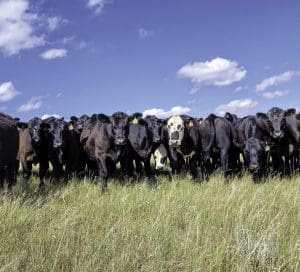By Patti Wilson Contributing Editor

Imagine some red faces in the anti-beef crowd. After decades of steady vilification by doctors, nutritionists and environmentalists, ruminants are finally being recognized as sharing a life-giving gift. It’s great news for grass eaters and their caretakers.
Scientists at the University of Chicago have discovered that trans-vaccenic acid (TVA), a long-chain fatty acid found in beef, lamb and dairy products, improves the ability of immune cells to fight cancerous tumors.
Recognition goes to Matt Wood of the University of Chicago, who wrote an article featured on the SciTechDaily.com website dated Nov. 24, 2023. Much of this writing will reflect his piece. It is also necessary to note that, in these kinds of complex studies, small armies of devoted scientists are involved in painstaking research for the long haul. Most seem to have unpronounceable names and lengthy titles, which is my own observation. They need to be recognized as an indispensable asset, but few will be mentioned by name here.
What is TVA?
TVA is a long-chain fatty acid unique to grazing animals. It enables cancer- fighting cells called CD8+T to infiltrate and kill malignancies, according to the recent study by the University of Chicago. Cancer patients with higher levels of TVA in their bloodstream respond better to immunotherapy. Scientists suggest it may have potential as a nutritional supplement to complement clinical treatments for cancer.
Jing Chen, PhD, the Janet Davison Rowley Distinguished Service Professor of Medicine at the University of Chicago, is one of the senior authors of this recent research. He says, “There are many studies trying to decipher the link between diet and human health, and it’s very difficult to understand the underlying mechanisms because of the wide variety of foods people eat. But if we focus on just the nutrients and metabolites derived from food, we begin to see how they influence physiology and pathology. By focusing on nutrients that can activate T cell responses, we found one that actually enhances anti-tumor immunity by activating an important immune pathway.” He goes on to say, “To see that a single nutrient like TVA has a very targeted mechanism on a targeted immune cell type, with a very profound physiological response at the whole organism level – I find that really amazing and intriguing.”
Scientists at the University of Chicago have discovered that trans-vaccenic acid (TVA), a long-chain fatty acid found in beef, lamb and dairy products, improves the ability of immune cells to fight cancerous tumors.
What’s the Process?
Chen’s lab researches metabolites, nutrients and other molecules circulating in the blood. They influence the development of cancer and response to cancer treatments. Two postdoctoral fellows were also listed as co-first authors, working with Chen: Hao Fan, PhD and Siyuan Xia, PhD. These two assembled a “blood nutrient” compound library made up of 255 bioactive molecules derived from nutrients. These compounds were screened for their ability to influence anti-tumor or immunity characteristics by activating CD8+T cells. The CD8+T are a group of immune cells critical for killing cancer or viral infections. Out of these 255, the most promising six were selected and tested on both human and mice cells. TVA performed the best. Only 20 percent of the TVA compound is broken down into other by-products, while 80 percent remains in the blood circulation. Chen remarked, “That means there must be something else it does, so we started working on it more.”
Diverse tumor types were studied in mice and cell models. Feeding the mice a TVA-enriched diet significantly reduced the tumor growth potential of melanoma and colon cancer, plus enhancing the ability of CD8+T cells to infiltrate tumors. Chen adds, “By focusing on nutrients that can activate T cell responses, we found one that actually enhances anti-tumor immunity by activating an important immune pathway.”
Additional molecular and genetic analyses were performed, using new technology to monitor DNA sequencing in an extraordinarily complex assay. These also backed up findings that TVA has cancer-fighting abilities. Further independent studies show that melanoma and colon cancer are not the only malignancies that benefit from TVA’s. Analysis of blood samples from hospital patients undergoing immunotherapy treatment for lymphoma revealed that those with higher levels of TVA tended to respond better to treatment than those with lower levels. It has also been discovered that TVA enhanced the ability of an immunotherapy drug to kill leukemia cells in patients.
A Nov. 24, 2023, article on focustechnica.com, written by Crystal Jones, gives a detailed explanation of how TVA works. She wrote, “These additional assays, done by both the Chen and He [sic] labs, showed that TVA inactivates a receptor on the cell surface called GPR43, which is usually activated by short-chain fatty acids often produced by gut microbiota. TVA overpowers these short-chain fatty acids and activates a cellular signaling process known as the CREB pathway, which is involved in a variety of functions including cellular growth, survival and differentiation. The team also showed that mouse models where the GPR43 receptor was exclusively removed from CD8+T cells also lacked their improved tumor-fighting ability.”

But Hold Your Horses
With all this good news about beef, lamb and dairy, our Dr. Chen seems unable to cut our love for eating red meat completely loose. He says it’s “important to determine the optimized amount of the nutrient itself. There is a growing body of evidence about the detrimental health effects of consuming too much red meat and dairy, so this study shouldn’t be taken as an excuse to eat more cheeseburgers and pizza; rather, it indicates that nutrient supplements such as TVA could be used to promote T cell activity.”
Chen believes that other fatty acids from plants will be proven to do the same thing, as well. Instead of relying totally on animal products, researchers are looking for a similar compound in plants that has the same tumor-fighting abilities. Chen said his team hopes to build a library of nutrients circulating in our blood to understand their impact on immunity and other biological processes like aging. He continued, “After millions of years of evolution, there are only a couple hundred metabolites derived from food that end up circulating in the blood, so that means they could have some importance in our biology.
Lots of Information
I found several scientific websites with virtually the same information as that provided by SciTechDaily.com. Interestingly, MSN.com, a news source not probably frequented by our readership, ran two articles smiling favorably upon red meat consumption.
Although this news has not been made common household conversation (there are so many other things to discuss nowadays), it’s still a refreshing new fact for meat and dairy producers to fall back on when we’re confronted by the anti-ruminant crowd.
Special thanks also goes to the Jan. 20, 2024, issue of The Shepherd magazine, where I caught a short blurb on a late page about this topic. I felt the news was worthy of a full-length article. We need to spread the good information any time we can.





